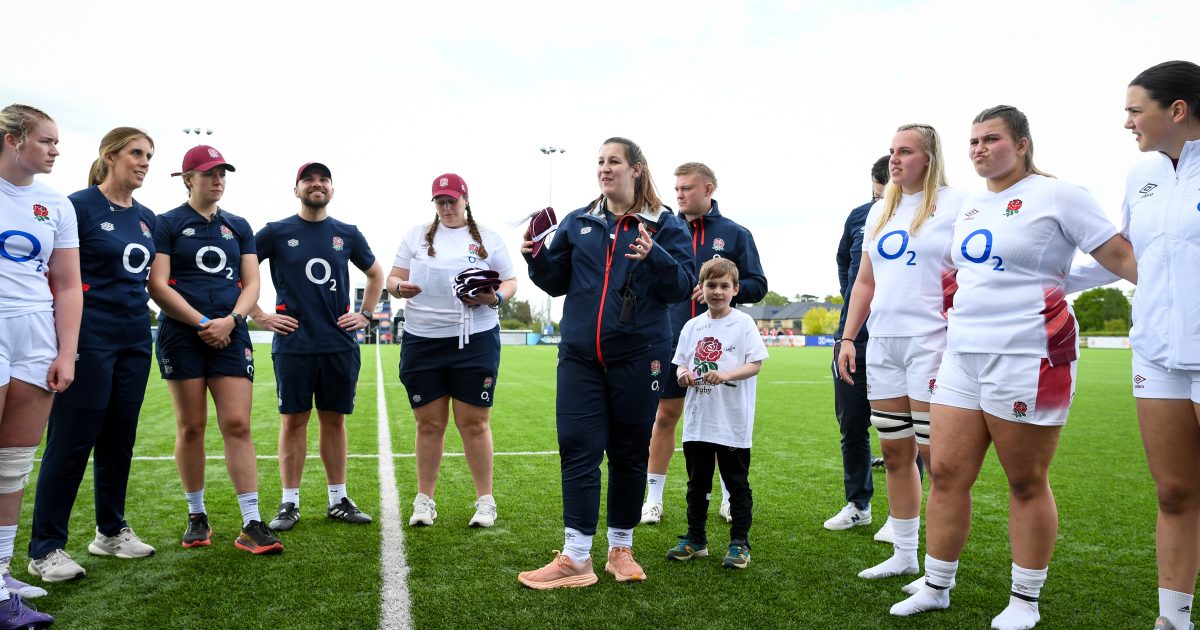Blossoming Red Roses: A look at the U20s women’s pathway in England

In July 2024, the Six Nations Women’s Summer Series will take place for the first time ever for the Under-20s age group.
As an ever-growing entity within the men’s pathways, the Six Nations will break new ground for women’s game with the Summer Series.
Taking place across three match days from 4th -14th July in Parma, Italy, the tournament will provide the natural step up from Under-18s competition and will feature predominantly U20s players, with an additional allowance of three Under-23 players per union in a match day squad.
England Women’s U20s head coach LJ Lewis tells RugbyPass about how the England women’s pathway team operates and how they’re working to nurture the next generation of Red Roses.
“From an U20s point of view, this is our first year where we’ve had something concrete put in. We’ve got a Six Nations tournament at the start of July, so we’re going to be over in Italy playing three fixtures with all of the other nations included in the Six Nations. That’s the first time ever that that has happened for women in this age group,” she said.
“It’s been happening for the U18s now for two or three years, so they have a tournament every year in a slightly different format which is more in line with the men’s u18s. They play two 35-minute games and then they have a 70-minute game at the end. The trickle-through from that has meant that other nations have built up their player base so it’s the right time to bring it into our [U20] space.”

Previously, and for all other competitions outside of the newly introduced Six Nations, fixtures are sourced by the coaching team.
In addition, the women’s U20s do not currently have a World Championship as the men’s pathways do, so for development of players it is imperative that they source as many fixtures as possible.
“Traditionally, post-Covid, a lot of things fell away for this age group,” Lewis explained. “I worked with them two years ago for the first time when Amy Turner was head coach and we had a home and an away fixture against France and that was the only thing that we had set in stone. We tried to find another fixture, and we played Scotland Futures as they were known at the time. We’ve also had opportunities against the British Army which they did last year as well.
“This year, because we have the Six Nations tournament and people are realigning budgets to be able to support that, we sourced fixtures against the British Army, France away, and Wales. We’ll have another training block before we then go out to Italy for our Six Nations.
“That’s how it works for us now this year, but it’s always been down to us to find the competition for our programme and now with the Six Nations being introduced for us, hopefully, that stays and it evolves to some standalone fixtures that will end up potentially mirroring the Red Roses.”
In the Six Nations this summer England U20s will face France U20s, a matchup that has been common in the past between the two unions and one which Lewis believes is their closest rivalry at present, which is rather reminiscent to the senior sides.
“France have a very strong women’s pathway, they definitely resource it well. They have a good club competition where a lot of their U20s group play, quite like England with the PWR [Premiership Women’s Rugby] clubs,” she commented.
“A lot of their [France] U20s are housed in those club spaces so they’re getting week-in-week-out good competition. Since I’ve been involved in the last three years, they’ve been our biggest competitor. Because they have a strong club league as well, that gives their players those great playing opportunities. They have some great athletes.
“I think the difference between us and them is they have slightly better raw athletes, and we have better rugby players in terms of knowledge of the game, tactical awareness, game awareness, those sorts of things. When we meet, you get your traditional French competition, they want to play and they want to play hard. We have players who are probably a bit more of a natural rugby player, something like the set piece is a bit more of a natural thing for them [England].”
When scouting talent for the pathway, Lewis and her coaching team tap into a variety of resources in England.
An important pillar of that is the British Universities and Colleges Sport (BUCS) competition, which was won this season by Hartpury.
In addition, the PWR clubs boast highly talented young players and provide another central arena for Lewis’s work.
“The BUCS element is really key for players. It’s a massive opportunity for game exposure. The likes of Exeter, Loughborough, Hartpury, Durham, those that are in that top league are key so I watch those fixtures,” Lewis, the former head coach of Wasps Women, said.
“I’ve been to some in person, and then my analyst and I look at those fixtures and he pulls up sections to watch on them. It’s a great space for me to keep an eye on, and the majority are connected to a PWR club so that then also feeds into how their pathway works with the clubs and again that helps me.
“As we’ve started to narrow down the squad our contact with them ups, we’ve got a touch point every month now with a camp each month before we head to the Six Nations; lots of face-to-face touch points. I try to get out to games, whether that’s the PWR or BUCS. Then there will be club visits.
“Each PWR club has an U23 coach so that will be my main channel of communication. Informal pick-ups with players as well. I’d love to see them and have them together more, but I think we’re pretty lucky at the moment with where we’re at with the programme. It’s pretty regular, but it picks up more and more now.
Another essential part of Lewis’s role is to best prepare her players for the potential step up to the senior Red Roses side.
During camps, members of the Red Roses coaching team will often be involved to meet with their u20s equivalent and share knowledge on how they can best help mirror the environment within the senior side.
The cohesion between the pathway and the Red Roses is further entrenched by the fact that Lou Meadows, the current Red Roses attack coach is the former U20s head coach.
“She’s worked in this space for a season so she has good understanding of the challenges that are faced here, and that helps,” Lewis said. “They’re a new coaching set-up, so with John Mitchell coming in, he’s definitely made it very clear that we would like to ensure we have a connection between the U20s and the Red Roses team.
“Louis Deacon [forwards coach] and Lou Meadows have been into a recent U20s camp as well as the Red Roses operations manager and their analyst, the crossover with staff is nice. That helps with commonalities and sharing of ideas, we can help mirror some parts of the Red Roses camps to help transfer players.
“In terms of the rugby, there’s definitely been a move to try and marry up some language piece. It’s obviously different because of the population they’re working with, but there is definitely a desire to see how we can keep strengthening that while we develop the u20s players.
“We have a piece of work to do now, Women’s Rugby World Cup 2025 isn’t far away, but the skill gaps, the potential positional gaps, I think now we have got growth for that to happen in our environments. They’re a new [coaching] group but already there have been some positive connections.”
One area which has been highlighted as one for development within the women’s game in the past has been kicking.
The recent Guinness Women’s Six Nations showed a high level of kicking across all nations, but as the skill evolves with increased professionalism, it is also a key area of development for Lewis’s pathway to ensure they are best prepared for top-level rugby.
“Pre-Christmas we had more of a focus on skills development and we were really purposeful with the kicking element. In both the regional and the national camp environments the backs had whole sections where they looked at just kicking, which definitely highlighted that some players still don’t have that triple-threat option, so it’s definitely something in our space that we’ve highlighted, even if it’s a skill a player doesn’t feel comfortable with, we want to make sure they’re supported to develop of that in our space.
“The PWR is growing in that area [kicking] so naturally that skillset will be developed anyway because the Premiership is using it. When I watch some of the BUCS fixtures, a number of players have a rounded triple-threat game so the kicking element you see and that’s coming through there too as well. It’s growing [in the women’s game] and we’ve definitely been intentional with it. Again, within the Red Roses it’s also evolving as well.”
While the introduction of the Women’s Lions Tour in 2027 is another big stepping stone for the future of the women’s game, Lewis also hopes that it will boost pathways around the world to provide strong competition for England.
“Opportunity to be part of a massive brand and a massive history of the game of course is amazing and there are going to be some players who are going to rise to the top and become well-known, and rightly so.
“From a pathway point of view, for ourselves, Wales, Scotland, and Ireland it will help to grow their opportunities as well. They know that they’ve got that chance to be part of the Lions. I suppose my own question would be that we don’t want to slow down the development of the rest of the world,” she explained.
“Ultimately, I want England to always be the best, but we can only be the best if we’ve got competition, so making sure that the rest of the world doesn’t fall behind is important. They’ve planned New Zealand for the first tour, but for the men going South Africa and Australia is massive as well.
“Will this help their nations get more investment, more resources, so that they can then be a viable option? Going to South Africa, a massive rugby country, that can only be good for the whole game, not just here in England or in the other Lions nations. It’s really exciting, I just don’t want the rest of the world to slow down because we need them to keep pushing us.”
New tickets for Women’s Rugby World Cup 2025 are now available, with prices starting at £10 for adults and £5 for children. Buy now!





























































































Son, whith just " raw athlete “ , you are able to beat “ better rugby players “ by 74 points….
May be England should recruit in athletics….